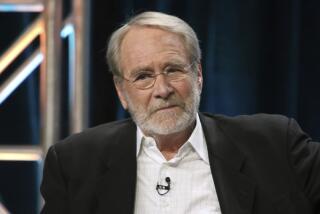The guy dug deep
- Share via
HOW’D you like to have been the casting director the first day Robert Mitchum walked in for a screen test? “Excuse me, Bob, would you mind opening your eyes? Oh, they are open; OK.”
Those hooded, sleepy-time eyes would’ve been only the beginning of the trouble. There’d be that slouch, Mitchum’s default posture if his part didn’t call on him to execute a specific action. Just that whole casual thing that was going on, as if this young actor wasn’t entirely serious about acting. As if he didn’t know that shark-face profile wasn’t the stuff of stardom.
Then, of course, you’d have looked at the test and seen that this very special fellow projected a unique charisma made up of a strange but convincing sardonic romanticism. If you don’t believe it, check out “Robert Mitchum: The Signature Collection,” which arrives in stores Tuesday.
Vincente Minnelli was only one of the directors to point out Mitchum’s studied diffidence was just that -- studied. Minnelli said he had never seen an actor dedicate himself so much to a part as Mitchum did on MGM’s “Home From the Hill,” one of the box set’s six films.
The actor was only 43 when he made the 1960 movie, but -- perhaps because of a notorious private life that matched those of his most excessive characters -- his face had thickened from its once-angular V-shape into a thick square. Turns out, though, that the face was perfect for Mitchum’s role of a rich Texas landowner with a son (George Hamilton) by his wife (Eleanor Parker) and another one (George Peppard) by, well, not his wife. The part -- a braggart, a bully, hypocritical and unapologetic -- begs for a complexity that Mitchum delivers without straining or breaking a sweat.
Earlier, Mitchum had been bound by contract to RKO, a studio that at times seemed determined to cast its most interesting star in as many mediocre movies as could be jammed into a year. Occasionally, though, a gem would sneak through, with none ever better than the box’s other treasure, “Angel Face” -- directed by the Viennese-born Otto Preminger, who never surrendered either his Continental sophistication about sex or cynicism about money. Mitchum plays an ambulance driver turned chauffeur who unknowingly gets entangled in the machinations of a beautiful, desirable but insane rich girl played with unforgettable, if sickly, allure by Jean Simmons.
After a series of movies in which Mitchum had played a series of confident, semiswaggering tough guys, he made the most of a chance to play a wiseguy turned chump. Confident in his own masculinity, Mitchum’s character, outlined by the actor’s offhand virility, virtually saunters into his looming demise, his love object’s deadly scheme beautifully embodied by images made dreamy -- or nightmarish -- by subtle shades and threatening camera movements.
Of the remaining four movies, “Macao,” an “exotic” adventure made at RKO in 1952, had the best chance to be good. Mitchum plays a footloose, slightly shady American adventurer who ends up on the title island -- an Eden of gambling, vice and corruption -- mostly by chance. The problem is that everyone seems to think he’s an undercover cop, not a long-term vocation in a neighborhood where the local police chief (Thomas Gomez) is on a gangster’s payroll.
The good news for Mitchum and “Macao” is that RKO uncharacteristically hired an eccentric genius, Josef von Sternberg, to direct. More characteristically, the studio sent a parade of executives to the set to make sure Von Sternberg didn’t make a Von Sternberg movie. Only tantalizingly evocative dockside action scenes remain as evidence of what might have been.
“The Sundowners,” from 1960, is a promising tale of an Australian sheep ranching family, with Deborah Kerr playing Mitchum’s wife, but it quickly sinks under the weight of its own self-seriousness. An absurdly portentous tone is the undoing of “The Yakuza” (1975), in which Mitchum returns to Japan to straighten out some gangster matters. And the comedy western “The Good Guys and the Bad Guys” (1969) relies too much on the idea of an aging sheriff chasing an aging foe to amount to much.
What these last movies do, though, is give lie to the idea that Mitchum, with a couple of exceptions, ever walked through a part. Yeah, the guy may look laid-back, but it doesn’t take a genius to see Mitchum is the film’s life-investing motor.
Go ahead, casting director, sign that man up.
More to Read
Only good movies
Get the Indie Focus newsletter, Mark Olsen's weekly guide to the world of cinema.
You may occasionally receive promotional content from the Los Angeles Times.










